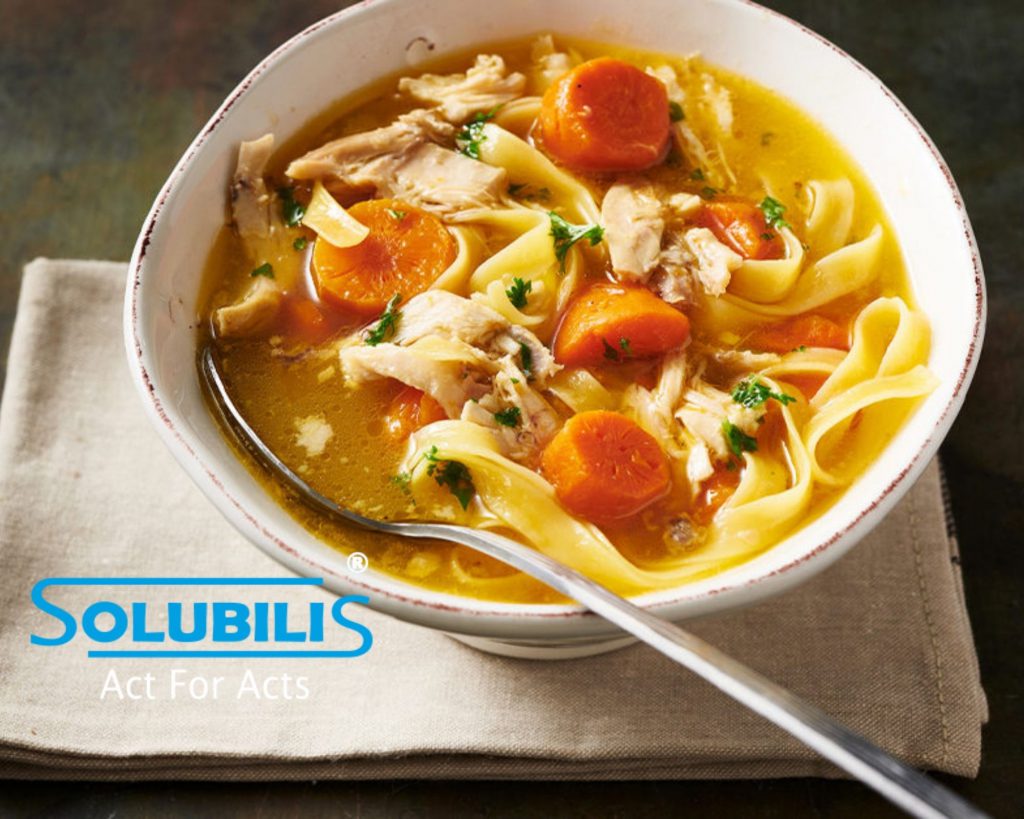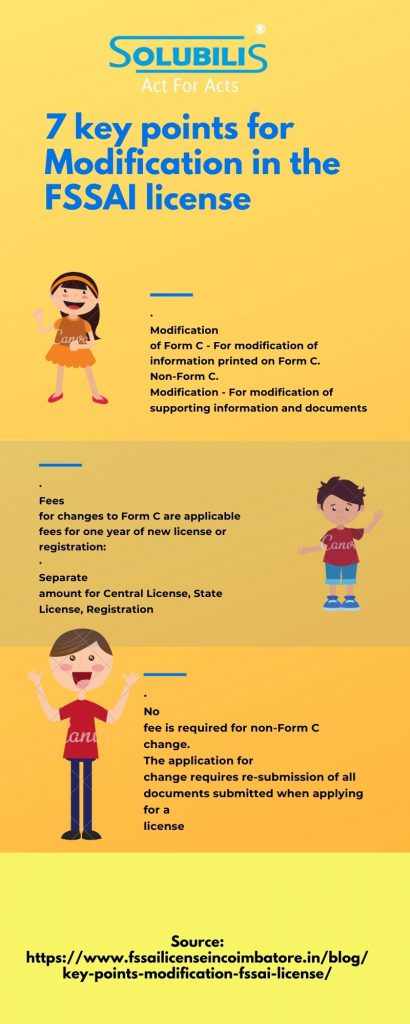
key points for Modification in the FSSAI license
March 4, 2021
TALK TO EXPERTS
The FSSAI Food License is the only and most important license required for food business operators in India. Food Business Operators (FBOs) must report any changes to the business to the FSSAI within a reasonable time. Any changes related to any type of business, standard of product, range of products or composition etc. should follow the rules. Once the FSSAI license or registration (Form C) has approved, an application for change of FSSAI license or registration needs to have filed for any change required at the same time.
Essential condition to get FSSAI license
The key points required to file an application for modification of FSSAI license are as follows:
There are 2 types of changes to the FSSAI license or registration:
- Modification of Form C – For modification of information printed on Form C.
- Non-Form C. Modification – For modification of supporting information and documents.
- Fees for changes to Form C are applicable fees for one year of new license or registration:
- Separate amount for FSSAI Central License, State License, Registration
- No fee is required for non-Form C change.
- The application for change requires re-submission of all documents submitted when applying for a license.
- A declaration indicating the change for which the application has been filed is also required.
- The food business operator is required to attach supporting evidence or proof of change to the application, as required.
- The application for change is examined by the Designated Officer (DO) in respect of the existing Form C. Upon verification, the DO may raise a query or objection to the application, seek clarification or require additional information from the FBO. This query needs to be answered within 30 days.
- Changes are mostly made in the business for its growth and development. Changes to Form C are necessary for any purpose, such as adding a new business, changing addresses, changing communication details, or changing product categories. The help of regulatory experts can simplify the processing of documents for filing. Coordination and communication with designated officers can be done with the help of professional liaison.

1.Hygiene and cleanliness
The FSSAI Food Licensing and Registration Guidelines require that a restaurant properly maintain clean and food preparation areas, toilets and changing facilities.
A.) Food Preparation Areas – Restaurants should use chimneys with suitable suction capacity for all cooking processes.
- B) Hand washing facilities and toilets – The restaurant should have a sufficient number of washbasins with taps for hot and cold water 24 hours a day.
C.) Changing Facilities – A restaurant should provide its staff with appropriate facilities instead of the need for their costumes.
-
Good hygiene
- A) Cleaning – Restaurants should ensure that working areas and appliances / utensils are clean and free from disinfectants.
B.) Water supply – There should be adequate supply of potable water. The water should not contain any chemicals and bacteria which are harmful. Restaurants should make ice and steam using the same potable water.
C.) Raw Materials – Restaurants should follow specific FSSAI guidelines regarding milk and milk products for handling and preparing raw materials and final products.
Preparation of fruits / vegetables
- 50 ppm before peeling. Cleaning cooked, ready-to-eat fruits and vegetables with chlorinated water.
- Cleaning devices made from non-absorbent food-grade materials, used to peel and cut fruits and vegetables.
- Preparation of vegetarian food items
- Raw and processed meats should be kept separate from other food items in restaurants.
- Proper and adequate cleaning of all surfaces with anti-bacterial agents before use.
-
D) Cooking
- Restaurants must take all necessary precautions to eliminate and reduce any potential health risks caused by cooking processes
- Cooking oil should not be used frequently to fry food items.
-
E) Chilling
Refrigerators, chillers and display units should be in good working condition, and a temperature of 5 degree C should always be maintained.

f) Cross-contamination
- Raw food / meat / poultry and ready-to-eat food should be kept separately in the eating joints.
- All employees in the restaurant should be adequately and properly trained to avoid any risk of cross-contamination.
-
Personal hygiene
Food manufacturing personnel should wear appropriate clothing in clean protective clothing, hair covering, footwear, gloves, face mask, etc.
Food production personnel should use disinfectant and hand washing facilities whenever they enter or re-enter the food processing sector. Hand washing facilities should be equipped with hands-free rated towels, liquid soap and disposable paper towels and waste disposal bins.
Rest Restaurants Rents should ensure that healthy practices such as drinking, smoking, spitting, etc. are prohibited on the food processing premises.
-
Collection
The FSSAI Licensing and Registration System Guidelines mandate that storage of raw materials and prepared foods should be appropriate. The following points should have kept in mind while storing food items in a restaurant.
- Chemicals, detergents and other cleaning materials in Rest Restaurants Rants should be kept separate from food products, in clearly specified areas.
- Ingredients, halved and finished products should have stored and maintained at the right temperature.
- Ingredients, intermediate and finished products should have properly handled and stored to prevent damage, contamination and spoilage.
- Restaurants should practice proper stock rotation (first-in-first-out) to prevent spoilage and spoilage of raw materials and finished products.
- Defective, suspicious and returned products must have the identification and segregated in designated area or container.
-
Special requirements for high risk foods
- A) Fruits / salads / fresh juices / drinks – Restaurants should ensure that cut fruits / salads, fresh juices, drinks and juice dispensing machines are clean and free of contaminants
- B) Confectionery Products – Confectionery products labelled indicating expiration date should have the properly refrigerated.
- C) Meat, poultry and fish products
All non-vegetarian products should have washed with fresh and adequately clean and fresh water.
All processing areas should have cleansed and disinfected regularly.
- D) Water based sauces, sauces etc.
Clean and sterile chopping boards should be used in restaurants.
It should use permitted food additives in the recommended amounts.
Glass / food-grade plastic containers must have used to store sauces and sauces in eating joints.
- E) Fried food
Good quality branded oil / fat should have used for cooking, frying and other operations.
Only packaged oil should have the usage used in restaurants.
Oil, once used, should not have the re-usage for frying and other cooking tasks.
